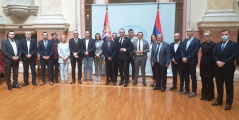At the sitting held on 29 March 2021, the members of the Committee on the Diaspora and Serbs in the Region considered the position and prospects of Serbs in the Republic of Slovenia and Romania in the context of support by the Republic of Serbia and the impact on the position of the Serb community in the region.
Committee Chairman Milimir Vujadinovic pointed out that the Serbian people have never been more united on basic national issues and that the presence of the guests at today's sitting is proof of it, as is the the presence of Serbian authorities everywhere that Serbs live.
"Only a strong Serbia such as the one created today by the government headed by the President of the Republic, Aleksandar Vucic, can be of help to Serbs in the region," Vujadinovic emphasised.
Vladimir Kokanovic, the President of the Union of Serbs in Slovenia, spoke about the position of Serbs in the country. He stressed that the Union was founded with the goal of bringing the Serbs living in that country together, in which, he pointed out, it had great help from the motherland. Kokanovic said that since the 15th century, when Serbs settled in Bela Krajina, they have not had greater support or better cooperation with the motherland than they do today. He said that the Union had initiated and implemented a number of projects, the most important of which is the introduction of additional classes in the Serbian language in all schools in Slovenia, for which 1,500 students applied.
The most important initiative launched by the Union concerned the census in Slovenia. Kokanovic explained that according to the 2002 census, 40,000 people declared themselves as members of the Serbian national minority, and 2011 census was purely statistical, without the possibility of declaring one's religion or nationality. That is why, in December last year, the Union submitted an initiative to the Government of the Republic of Slovenia to change this regulation and form a register of religious and national affiliation. However, despite the 15-day deadline, no answer has arrived to date, said Kokanovic.
Ognjan Krstic, the President of the Association of Serbs in Romania and member of the Romanian Parliament, spoke about the position of Serbs in Romania. He pointed out that the position of the Serbian national minority in that country is extremely good, but also that the number of Serbs living in Romania is dwindling, and according to the last census, there were only 18 and a half thousand of them.
"We enjoy the respect of the Romanian authorities who have recognised in us a partner always open for dialogue," said Krstic, emphasising that each minority has its representative in Parliament, which allows them to be politically active and involved in decision-making processes.
Commenting on the cooperation with the motherland, Krstic said that in the past they often had the impression that members of the Diplomatic and Consular Mission come to Romania "as punishment", while today the situation is completely different and, in Romania, Serbia is represented by proud people open to cooperation.
The Committee Chairman said that he personally believed that these appointments were "a punishment" because they were the embodiment of the policy pursued towards our compatriots in the region, where the goal was not unity but something quite the opposite.
The Committee Chairman went on to mention that Slovenia does not recognize PCR tests from Serbia, and appealed to the authorities in Slovenia to reconsider that decision and act in the interest of both the people of Serbia and the people of Slovenia.
"I appeal to our Slovenian friends, the Slovenian authorities, to reconsider this decision. Today, Serbia is a leader in the fight against the pandemic, as evidenced by the fact that many citizens from the region and some European Union countries are vaccinated in Serbia. If we are the leader in that, I see no reason why Slovenia would not respect a valid medical document issued in the Republic of Serbia," Vujadinovic concluded.
The sitting was chaired by Committee Chairman Milimir Vujadinovic, and was attended by the following Committee members and deputy members: Milan Ilic, Miodrag Linta, Aleksandar Markovic, Radovan Tvrdisic, Haji Milorad Stosic, Justina Pupin Koscal, Aleksandar Cotric, Prof. Dr Ljubisa Stojmirovic, Goran Milic, Stefan Srbljanovic, Mladen Boskovic and Janko Langura.




